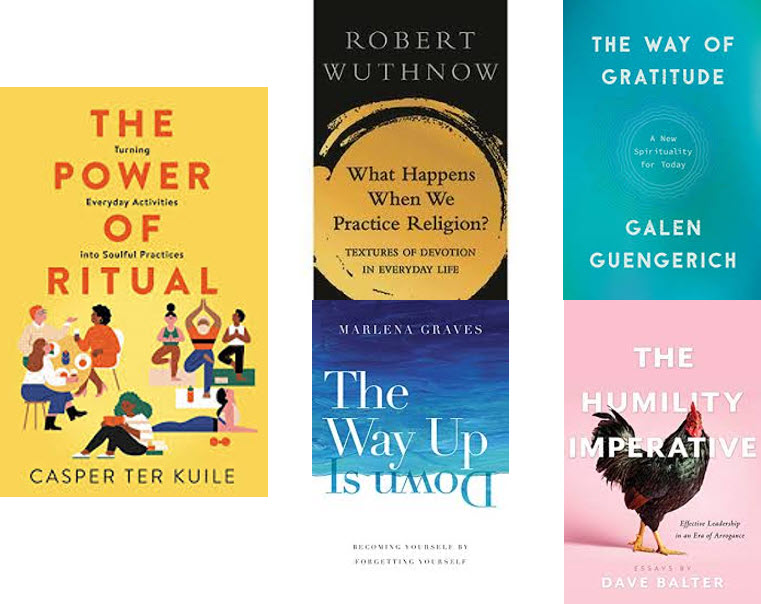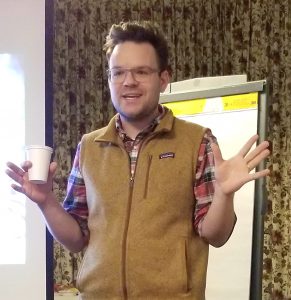
The ten best recently published books I’ve read since sharing my last list of great new books are
- (5+) The Power of Ritual: Turning Everyday Activities Into Soulful Practices by Casper ter Kuile (Harper Collins, 2020)
- (5.0) What Happens When we Practice Religion: Textures of Devotion in Everyday Life by Robert Wuthnow (Princeton University Press, 2020)
- (4.5) The Way of Gratitude: A New Spirituality for Today by Galen Guengerich (Random House, 2020)
- (4.5) The Way Up is Down: Becoming Yourself by Forgetting Yourself by Marlena Graves (IVP, 2020)
- (4.5) The Humility Imperative: Effective Leadership in an Era of Arrogance by Dave Balter (Houndstooth Press, 2020)
- (4.0) Sizing People Up: A Veteran FBI Agent’s User Manual for Behavior Prediction by Robin Dreeke (Portfolio/Penguin, 2020)
- (4.0) God and the Pandemic: A Christian Reflection on the Coronavirus and Its Aftermath by N.T. Wright (Zondervan, 2020)
- (4.0) Lost in Thought: The Hidden Pleasures of an Intellectual Life by Zena Hitz (Princeton University Press, 2020)
- (4.0) The Second Mountain: The Quest for a Moral Life by David Brooks (Random House, 2019)
- (3.5) Strategy First: How Businesses Win Big by Brad Chase (Greenleaf Book Group Press, 2020)
Best of the Best
Religion is changing. Robert Wuthnow and Casper ter Kuile offer insight that benefits all who seek to better understand the role of religion in contemporary life. For those who are religious – especially those religious individuals with leadership roles in religious communities – these books are must reads.
Robert Wuthnow
I was first introduced to Robert Wuthnow as a seminary student in the 1990s. Over the last few decades I’ve read quite a bit of his work, and have mentioned it here on So What Faith on several occasions, including:
- Sermon: Shifting Spiritualities (2015) – an sermon that explores the theme of his 1998 book: After Heaven: Spirituality in America Since the 1950s (University of California Press, 1998)
- Review of the God Problem (2013) – a review of The God Problem: Expressing Faith and Being Reasonable (University of California Press, 2012)
- Review of After the Baby Boomers (2011) – a review of After the Baby Boomers: How Twenty- and Thirty-Somethings are Shaping the Future of American Religion (Princeton University Press, 2007)
- Review of Boundless Faith (2009) – a review of Boundless Faith: The Global Outreach of American Churches (University of California Press, 2009)
Robert Wuthnow has served as a professor of sociology at Princeton University since the 1970s. His latest book – What Happens When we Practice Religion: Textures of Devotion in Everyday Life – provides an in-depth consideration of religious practice that includes an historical account of how scholars have arrived at the present approach, and a thorough consideration of this interdisciplinary approach drawing heavily from the fields of anthropology, psychology, religious studies, and sociology.
Intended primarily for use as a college textbook, What Happens When we Practice Religion works equally well as a refresher course for religious leaders or an introduction for newcomers to the study of religious practice.
Casper ter Kuile

I was introduced to Casper ker Tuile in January 2018 in the Library of Old South Church. As part of the faculty of the Adese Fellowship, Casper ker Tuile presented highlights of the research he was conducting as a Ministry Innovation Fellow at Harvard Divinity School.
He co-hosts the wildly popular podcast Harry Potter and the Sacred Text and is the author of How We Gather, which maps the emerging landscape of Millennial communities that are fulfilling the functions that religious congregations used to fill.
Casper ter Kuile’s first book – The Power of Ritual: Turning Everyday Activities Into Soulful Practices – is the result of half a decade of research that included thousands of conversations with people across the United States. It explores how people unbundle and remix a blend of ancient and modern practices from sacred and secular sources to craft personalized and meaningful lives. And, it offers guidance for doing so intentionally in ways that promote connection with oneself, with other people with the natural world, and with the transcendent.
Whether you think of yourself as religious, spiritual, or none of the above, this book will nudge you to reconsider what practices you engage in, and how those practices shape the person you are becoming and the ways you engage the world.